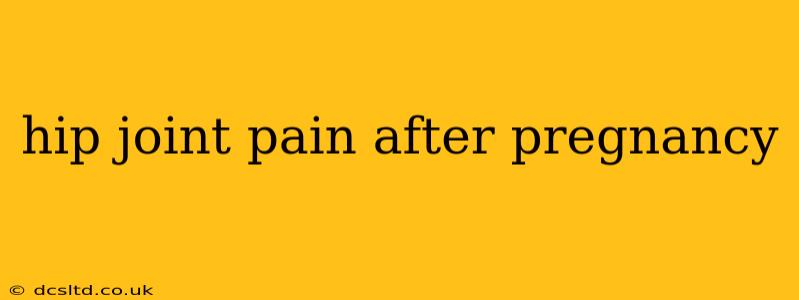Pregnancy and childbirth place immense stress on the body, and often, this manifests as hip pain. Many women experience hip joint pain after pregnancy, a condition that can significantly impact daily life and mobility. Understanding the causes, effective treatments, and preventative measures is crucial for regaining comfort and function. This comprehensive guide explores the common reasons behind postpartum hip pain, providing valuable insights into diagnosis, treatment options, and strategies for long-term relief.
What Causes Hip Pain After Pregnancy?
Several factors contribute to hip pain after pregnancy. These aren't always isolated causes, and often several contribute simultaneously.
-
Hormonal Changes: The dramatic hormonal shifts during and after pregnancy can soften ligaments and joints, leading to instability and pain in the hips. Relaxin, a hormone crucial for childbirth, plays a significant role in this joint laxity.
-
Weight Gain: The weight gained during pregnancy puts extra stress on the hips, exacerbating existing issues or creating new ones. The extra weight increases pressure on the joints, leading to pain and discomfort.
-
Postural Changes: Pregnancy alters a woman's center of gravity, leading to postural changes that can strain the hips, lower back, and pelvic joints. This can manifest as pain in the hips, groin, and buttocks.
-
Muscle Weakness: Carrying extra weight and the physical demands of pregnancy can weaken abdominal and pelvic floor muscles, impacting hip stability and increasing the risk of pain.
-
Diastasis Recti: Separation of the abdominal muscles (diastasis recti) is common after pregnancy and can contribute to pelvic instability and hip pain by altering core support.
-
Pelvic Instability: The hormonal changes and increased weight can lead to pelvic instability, where the joints of the pelvis don't function optimally, resulting in pain radiating to the hips.
How is Hip Pain After Pregnancy Diagnosed?
Diagnosis usually begins with a thorough physical examination by a healthcare professional. They'll assess your range of motion, palpate for tenderness, and inquire about your symptoms and medical history. Imaging tests, such as X-rays, ultrasounds, or MRIs, may be necessary to rule out other conditions and identify the extent of any damage or joint instability.
What Treatments are Available for Postpartum Hip Pain?
Treatment options vary depending on the severity and cause of the pain.
-
Physical Therapy: This is often the first line of defense, focusing on strengthening weakened muscles, improving flexibility and range of motion, and correcting postural imbalances. Exercises may include targeted hip strengthening, core strengthening, and pelvic floor exercises.
-
Medication: Over-the-counter pain relievers like ibuprofen or acetaminophen can help manage pain and inflammation. In more severe cases, your doctor might prescribe stronger pain medication or anti-inflammatory drugs.
-
Manual Therapy: Techniques like chiropractic adjustments or osteopathic manipulation can address joint restrictions and improve pelvic alignment.
-
Lifestyle Modifications: Losing weight after pregnancy, using supportive footwear, and avoiding activities that aggravate pain can significantly reduce discomfort.
-
Injections: In some cases, cortisone injections can provide temporary relief from inflammation and pain.
-
Surgery: Surgery is rarely needed for postpartum hip pain, but it may be considered as a last resort for severe cases unresponsive to other treatments.
Can Hip Pain After Pregnancy be Prevented?
While not all hip pain is preventable, taking proactive steps during and after pregnancy can significantly reduce the risk.
-
Maintain a Healthy Weight: Avoid excessive weight gain during pregnancy through a balanced diet and regular exercise (as advised by your doctor).
-
Engage in Regular Exercise: Consult your doctor or a physical therapist for safe and appropriate exercises throughout your pregnancy and postpartum period. Pelvic floor exercises are particularly beneficial.
-
Practice Good Posture: Maintain good posture to minimize strain on your hips and back.
-
Use Supportive Footwear: Wear comfortable shoes with good arch support.
How Long Does Hip Pain After Pregnancy Last?
The duration of postpartum hip pain varies greatly depending on the underlying cause and the effectiveness of treatment. For some women, it resolves within a few weeks or months. For others, it might persist for longer periods, requiring ongoing management. Consistent physical therapy and lifestyle modifications are key to long-term relief.
What Exercises Can Help with Hip Pain After Pregnancy?
Specific exercises will be recommended by your physical therapist based on your individual needs. However, some general examples include:
- Hip stretches: Gentle stretches targeting the hip flexors, hamstrings, and glutes.
- Core strengthening: Exercises such as planks and bridges to improve core stability.
- Pelvic floor exercises: Kegels to strengthen the pelvic floor muscles.
Remember to consult with your doctor or a physical therapist before starting any new exercise program after pregnancy. They can assess your individual needs and guide you safely through the recovery process. This information is for general knowledge and does not constitute medical advice. Always consult with a healthcare professional for diagnosis and treatment of any medical condition.
